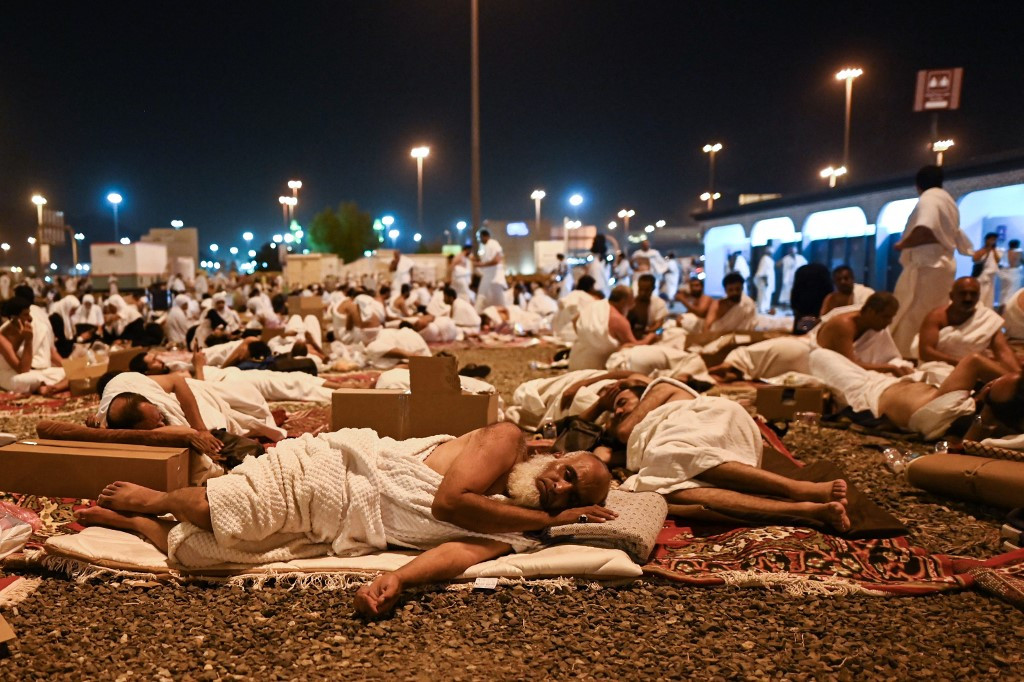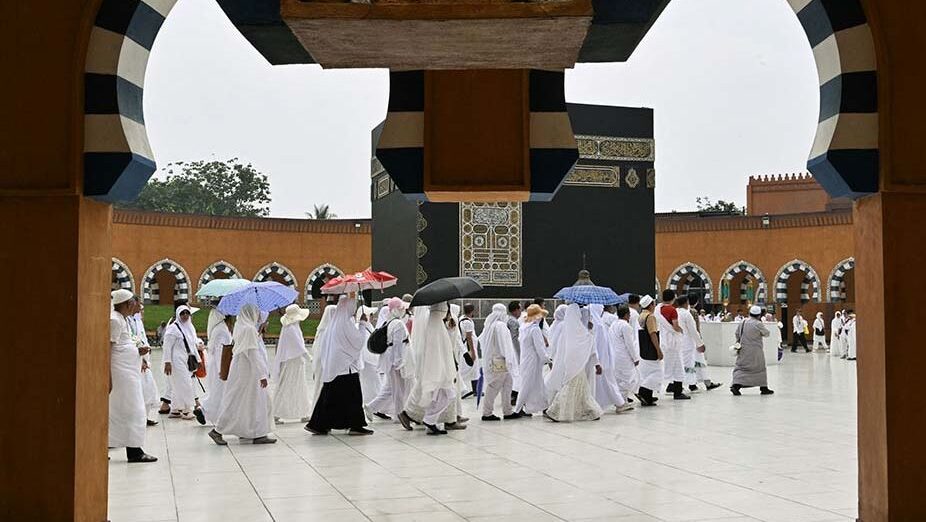Indonesian Haj Pilgrim Dies Minutes After Arriving in Saudi Arabia
Jakarta— An Indonesian pilgrim traveling for the sacred Haj pilgrimage has tragically died shortly after landing in Saudi Arabia, marking the first reported Indonesian fatality for this year’s Haj season.
The pilgrim, a 65-year-old woman named Daimah from Banjarnegara Regency, Central Java, had traveled with her husband and fellow pilgrims from Surakarta to Medina on May 3, 2025. According to official reports from the Surakarta Haj Management Committee (PPIH), she showed no signs of illness during the flight and even interacted normally with those around her.
However, shortly after landing, Daimah reportedly asked her husband, Karno Karta Semi, to accompany her to the restroom. As they exited the plane, she began to feel dizzy and collapsed suddenly. On-site medical personnel rushed to provide emergency care, but despite their quick response, they were unable to revive her.
Initial Cause of Death: Dehydration or Heart Attack?
Early reports suggested that dehydration from the long journey and hot conditions might have caused her collapse. However, after further examination, the official death certificate issued in Saudi Arabia stated that she likely suffered a heart attack.
The couple had been preparing for this pilgrimage for months, as the Haj is considered one of the most important journeys in a Muslim’s life. Speaking with officials, Karno expressed his deep sorrow but also his acceptance of her passing, seeing it as part of God’s will.
Burial at the Holy Site
Following her death, religious rites were swiftly arranged. A special prayer service was held at the Prophet’s Mosque in Medina, one of the holiest sites in Islam. Daimah was then buried at Baqi Cemetery, a revered burial ground near the mosque, where many companions of Prophet Muhammad are also laid to rest. Her husband was by her side throughout the entire process.

The Indonesian Ministry of Religious Affairs has confirmed that all pilgrims who pass away during the Haj are entitled to full insurance compensation. Additionally, the ministry has ensured that a “Badal Haj” — a Haj pilgrimage performed on behalf of the deceased — will be arranged for Daimah, so that she will still receive the spiritual reward of completing the sacred journey.
Indonesia’s Massive Haj Presence
This year, Indonesia has sent over 221,000 pilgrims to Saudi Arabia, making it one of the largest Haj contingents in the world. The Indonesian government takes the responsibility of organizing and caring for these pilgrims very seriously. Special care is given to elderly pilgrims, who make up a large portion of the traveling group.
Daimah’s death is the first officially reported Indonesian fatality in Saudi Arabia this season. Authorities are carefully monitoring the health and well-being of all pilgrims to prevent further incidents.
Another Tragic Loss Before Departure
In a related and equally heartbreaking case, a 71-year-old pilgrim from Bantaeng Regency, South Sulawesi, named Sainuddin Bin Tulo, passed away just one day before his scheduled departure. Sainuddin had been hospitalized for breathing difficulties in Makassar and had hoped to recover in time to join his group. Unfortunately, his condition worsened, and he died before he could even set foot on the journey.
According to the local Haj committee, his family will also be eligible for insurance benefits, and a Badal Haj will be arranged on his behalf.
Government Reminds Pilgrims to Prioritize Health
With these two deaths drawing public attention, the Indonesian government has reminded all pilgrims and their families of the importance of proper health screenings and preparation before embarking on the demanding Haj journey.
The Haj pilgrimage can be physically exhausting, involving long hours of walking, exposure to extreme heat, and navigating crowded spaces. Officials stress that even pilgrims who appear healthy should take precautions, including staying hydrated, getting enough rest, and following medical advice, especially for elderly travelers or those with underlying health conditions.
Ministry Ensures Support and Monitoring
The Ministry of Religious Affairs has also strengthened its on-the-ground support systems in Saudi Arabia. Teams of Indonesian doctors, nurses, and support staff are stationed at key locations, ready to provide medical assistance, advice, and logistical support for pilgrims who need it.
In addition, the ministry has implemented a health alert card system, which helps identify at-risk pilgrims and monitor their condition throughout the Haj. This system allows medical teams to act quickly if problems arise.
Public Reactions: Sadness, Prayers, and Reflections
News of the deaths has sparked an outpouring of grief across Indonesia. Many people have expressed condolences on social media, offering prayers for the deceased pilgrims and their families. Community leaders and religious figures have also reminded the public that dying during the Haj is considered a noble end in Islamic belief, as the person dies while fulfilling one of the most important religious duties.
One local religious leader in Banjarnegara, Daimah’s hometown, said, “Although we are saddened by her loss, we believe she has gone to a better place. She died on holy ground, in the middle of a sacred journey. This is something we believe carries great reward.”
Preparing for the Peak Haj Season
As the Haj season progresses over the coming weeks, the Ministry of Religious Affairs continues to coordinate closely with Saudi authorities to ensure smooth operations, especially during peak events such as the Day of Arafah and the stoning rituals at Mina, which draw massive crowds.
Indonesian authorities have advised pilgrims to pace themselves, avoid overcrowded places when possible, and report any health complaints early to the nearest medical post or group leader.
The government has also encouraged family members back home to stay informed and offer support through communication channels. With such a large number of Indonesian pilgrims traveling, maintaining strong communication and ensuring physical and spiritual well-being is a top priority.
Final Thoughts
While the deaths of Daimah and Sainuddin have cast a shadow over the start of this year’s Haj, they also serve as a solemn reminder of the challenges and deep spiritual meaning of this journey. For many, the Haj is the fulfillment of a lifetime dream, often requiring years of saving and preparation.
The Indonesian government, alongside Saudi authorities, continues to work hard to make the pilgrimage as safe and meaningful as possible for all.
As the pilgrimage season unfolds, the country prays for the safety, health, and spiritual success of all its pilgrims — and for the souls of those who passed away on this sacred path.
For more information click here
UAE’s $659 Billion Project Pipeline: A Glimpse into the Future



